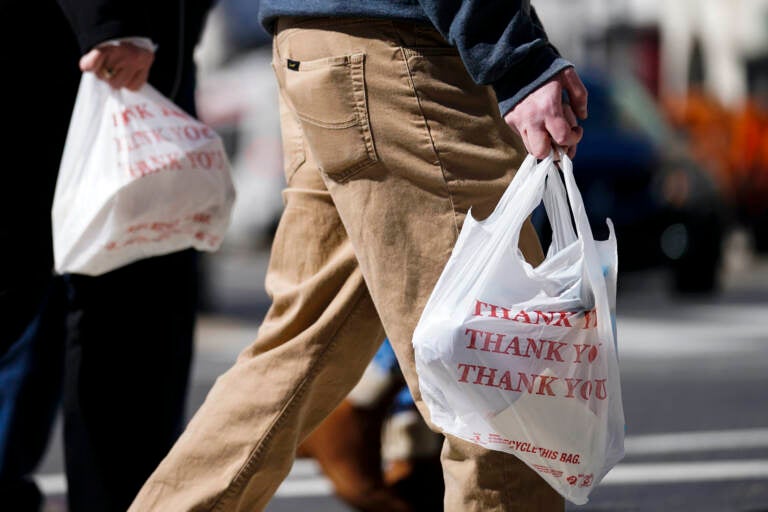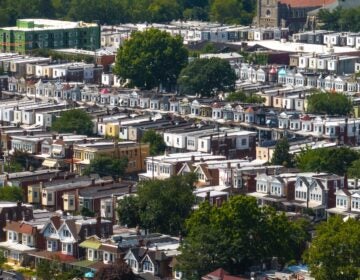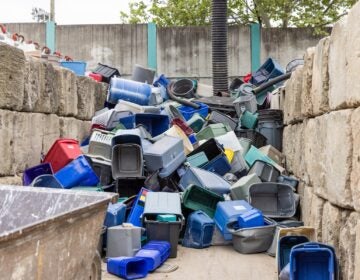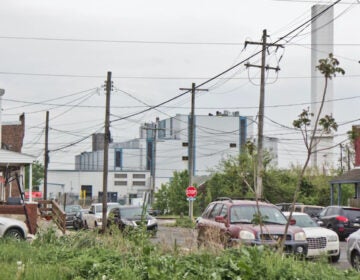Philly’s plastic bag ban is working, study finds
A city-commissioned study estimates the ban prevented enough single-use plastic bags to fill City Hall every eight months.

File hoto: Pedestrians carry plastic bags, Wednesday, March 3, 2021. (AP Photo/Matt Rourke)
Results are in for the first year of Philadelphia’s plastic bag ban.
A study estimates the policy eliminated over 200 million plastic bags in the city — enough to fill City Hall every eight months.
“We find evidence that the policy was quite effective,” said Daniel Banko-Ferran, a PhD student at the University of Pittsburgh who led the study commissioned by the city on the impact of the ban.
The study focused on bag use in grocery stores. Researchers collected data in 10 stores in the city of Philadelphia and seven stores in its suburbs — a total of around 9,000 people using over 21,000 bags — both before and after the plastic bag ban. This allowed them to account for changes caused by factors other than the ban.
The city began implementing the ban, which applies to single-use plastic bags and paper bags made of non-recycled content at businesses including supermarkets, convenience stores, shops, and restaurants, in July 2021, requiring businesses to post signs about it. The ban went into effect in October 2021, and the city started fully enforcing it in April 2022.
By August 2022, the portion of customers using plastic bags at the Philly stores in the study had dropped by 94%, the study found.
Reusable bag usage nearly doubled, and paper bag usage increased even more. But because of the decline in single-use plastic bags, bag usage overall decreased.
Banko-Ferran said the impact of the ban became most obvious after the city started issuing warnings to stores in the fall of 2021.
“We know that keeping our beautiful city clean and clear of trash is key for the health and wellbeing of all Philadelphians,” said Mayor Jim Kenney in a statement Thursday. “This success of the Plastic Bag Ban Ordinance shows how the City, together with local business and consumers, can stop waste before it starts.”
Aminata Sandra Calhoun, an environmental justice advocate who lives in West Philly’s Belmont neighborhood and leads cleanups for the Centennial Parkside CDC five days a week, says she’s seen the effect of the plastic bag ban.
“I definitely have seen a reduction in plastic bags in the trash and litter in the streets,” Calhoun said.
But Calhoun says there’s more progress to be made. She still sees some corner stores and small takeout restaurants giving out plastic bags, she said. Eventually, she’d like to see plastic packaging disappear entirely.
“We’re taking baby steps with addressing the [single-use] plastic bags,” Calhoun said. But “everything you can think of comes in plastic. So it’s not just the plastic bag, it’s a deep dive into the whole packaging system.”
The environmental impact of Philly’s plastic bag ban is not yet clear. Plastic bags contribute to litter in the city and can clog up recycling machinery. Paper bags are recyclable and degrade easier than plastic, but have been found to require more energy to manufacture. Banko-Ferran’s study did not analyze any of these factors.
“It really depends on what metric you want to use to measure the environmental impact,” Banko-Ferran said. “It would be great to do a larger environmental impact study in the future.”
The environmental advocacy group PennEnvironment, which helped to draft the original bag ban ordinance, released a statement about the study Thursday, calling the results “something that the public, businesses and elected officials alike should applaud.”
But the group wants the city to go further. Faran Savitz, zero waste advocate at PennEnvironment, called on City Council to establish a 15-cent fee on paper bags.
“It’s time for Philadelphia to leave our longstanding ‘throw away’ norm because there is no true ‘away’ for disposable bags,” Savitz said. “The vast majority of them just end up in a landfill or incinerator, or litter our environment. Nothing we use for a few minutes should be allowed to pollute our surroundings for hundreds of years to come.”

Subscribe to PlanPhilly
WHYY is your source for fact-based, in-depth journalism and information. As a nonprofit organization, we rely on financial support from readers like you. Please give today.









